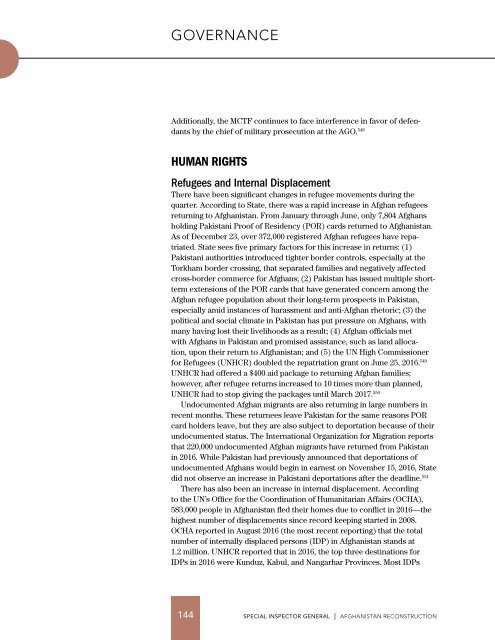SIGAR
2017-01-30qr
2017-01-30qr
Create successful ePaper yourself
Turn your PDF publications into a flip-book with our unique Google optimized e-Paper software.
GOVERNANCE<br />
Additionally, the MCTF continues to face interference in favor of defendants<br />
by the chief of military prosecution at the AGO. 548<br />
HUMAN RIGHTS<br />
Refugees and Internal Displacement<br />
There have been significant changes in refugee movements during the<br />
quarter. According to State, there was a rapid increase in Afghan refugees<br />
returning to Afghanistan. From January through June, only 7,804 Afghans<br />
holding Pakistani Proof of Residency (POR) cards returned to Afghanistan.<br />
As of December 23, over 372,000 registered Afghan refugees have repatriated.<br />
State sees five primary factors for this increase in returns: (1)<br />
Pakistani authorities introduced tighter border controls, especially at the<br />
Torkham border crossing, that separated families and negatively affected<br />
cross-border commerce for Afghans; (2) Pakistan has issued multiple shortterm<br />
extensions of the POR cards that have generated concern among the<br />
Afghan refugee population about their long-term prospects in Pakistan,<br />
especially amid instances of harassment and anti-Afghan rhetoric; (3) the<br />
political and social climate in Pakistan has put pressure on Afghans, with<br />
many having lost their livelihoods as a result; (4) Afghan officials met<br />
with Afghans in Pakistan and promised assistance, such as land allocation,<br />
upon their return to Afghanistan; and (5) the UN High Commissioner<br />
for Refugees (UNHCR) doubled the repatriation grant on June 25, 2016. 549<br />
UNHCR had offered a $400 aid package to returning Afghan families;<br />
however, after refugee returns increased to 10 times more than planned,<br />
UNHCR had to stop giving the packages until March 2017. 550<br />
Undocumented Afghan migrants are also returning in large numbers in<br />
recent months. These returnees leave Pakistan for the same reasons POR<br />
card holders leave, but they are also subject to deportation because of their<br />
undocumented status. The International Organization for Migration reports<br />
that 220,000 undocumented Afghan migrants have returned from Pakistan<br />
in 2016. While Pakistan had previously announced that deportations of<br />
undocumented Afghans would begin in earnest on November 15, 2016, State<br />
did not observe an increase in Pakistani deportations after the deadline. 551<br />
There has also been an increase in internal displacement. According<br />
to the UN’s Office for the Coordination of Humanitarian Affairs (OCHA),<br />
583,000 people in Afghanistan fled their homes due to conflict in 2016—the<br />
highest number of displacements since record keeping started in 2008.<br />
OCHA reported in August 2016 (the most recent reporting) that the total<br />
number of internally displaced persons (IDP) in Afghanistan stands at<br />
1.2 million. UNHCR reported that in 2016, the top three destinations for<br />
IDPs in 2016 were Kunduz, Kabul, and Nangarhar Provinces. Most IDPs<br />
144<br />
SPECIAL INSPECTOR GENERAL I AFGHANISTAN RECONSTRUCTION







